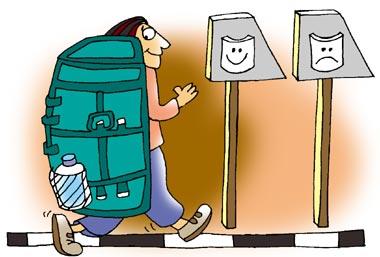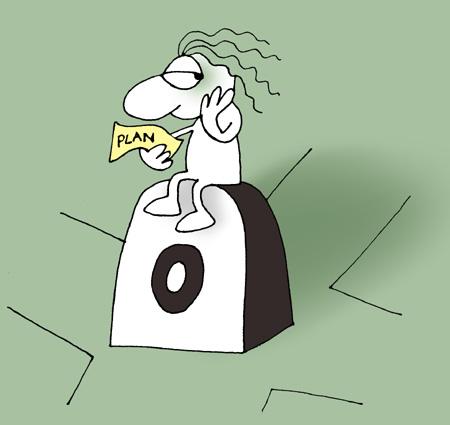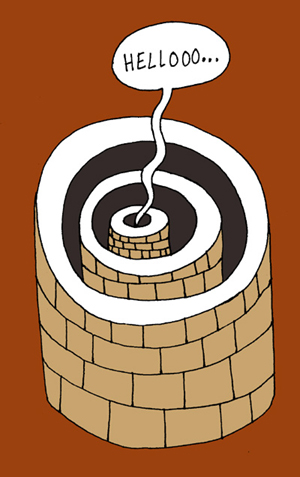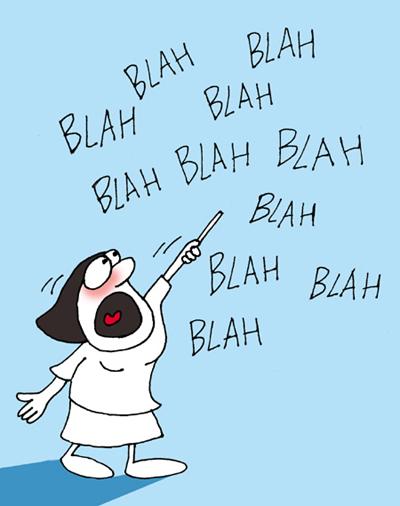Divya Nair
This year, find the time to explore the office beyond your cubicle and make reading a habit among other things, suggest experts. Illustrations: Uttam Ghosh
Still sulking over the promotion you missed last year? Or are you worried about facing a business client you'd upset last month?
Whatever it is, the New Year is definitely not the time to sulk and worry. Famous American politician Hugh White once said that "mistakes are lessons of wisdom".
However, according to HR personnel, 70 per cent of working professionals do not realise what their mistakes are, unless they fail at a given task or someone points it out to them.
So we decided to talk to a few career experts, who outlined the common mistakes people make in the course of their careers and offered advice on how to correct them. Read on...
Please click NEXT to continue reading...
1. Working in isolation
For most employees, staying focused on the task at hand, meeting deadlines and performing better than last year is all that matters.
Whatever happened to teamwork?Have you ever explored your workplace beyond your cubicle and department?
Rajesh Nair, CEO of TopGear Consultants from Mumbai observes that finance professionals are the most reticent at work, either interacting with their own teams or preferring to stay confined to their cubicles.
"Most professionals pretend to be self-centred and care less about developing their interpersonal and networking skills at work," he says.
"This year, why not try and help a colleague finish his/her work, share your ideas at a meeting and be more proactive?" adds HR consultant Mehek Tolani from Delhi.
Moreover, working in teams or groups will help you get to know your colleagues better.
"Also meet people from outside your department, have open discussions at lunch or otherwise, and widen your network," adds Nair.
2. Not admitting your weaknesses
One of the biggest mistakes most professionals make is ignoring their own weaknesses.
Not many realise that the best way to overcome your flaws is by admitting to them and then learning to overcome them.
Remember the SWOT analysis from your college days? It's time you applied that in your professional life too.
"Analyse your strengths, weaknesses, opportunities and threats (if any). This will help you gauge where you stand in your career graph and make necessary amends," advises Nair.
"Work on your weak areas and capitalise on the opportunities available to you -- the project you are working on, the people who bring you business (clients, customers) are great places to start," adds consultant Vedant Mistry, Excel Consultants, Navi Mumbai.
3. Inappropriate planning
Great plans are like New Year resolutions.
At the start of the year, we all pledge to live by them, but as the months pass, the enthusiasm fizzles out.
Another big mistake professionals make is planning without having a strategy in place, which leads to inaction and hence disappointment.Plans fail most of the time due to lack of commitment and direction.
Offering a solution, Rajesh Nair says, "Divide your plans into short-term and long-term. This will help you set a timeline to your goals so that you attain them easily."
More importantly, don't just make plans -- resolve to stick by them.
4. Language barrier
Most corporate organisations have an international presence today. Despite this fact, fluency in English communications beyond the academic domain is often ignored by young professionals.
And while English skills are a must, how many of us have thought of learning a foreign language?
Rajesh Nair presents the big picture. "With international companies investing big in India, languages like Chinese, Japanese, French and German definitely add to your career. If your business clients are not comfortable communicating in English, which in most cases they are, knowing a foreign language will help you switch to their native language and make them more comfortable. It just shows your sensitivity toward your clients. Speaking in a native language will also help you express and share your ideas better," he says.
Besides, in Vedant Mistry's opinion, professionals who speak a foreign language also stand a better chance of bagging international projects and making it to the top.
5. Poor presentation
Did you hear your boss snore at your business presentation last week?
Don't ignore the warning signs, else you'll end up up the butt of all jokes at the office canteen, warns Mehek Tolani. "Many professionals lack the knack of presenting their ideas well," she says.
"You may have a good idea, but if you cannot present it in a way that catches the attention of your audience, what is its purpose?" asks Rajesh Nair.For better impact while delivering a presentation, learn to keep your words crisp. Also do a reality check and find out if your one-liners are actually funny, vulgar or just plain boring. "What clicks with your friends may not necessary impress your colleagues," cautions Tolani.
Why just business meetings -- even e-mails and text announcements related to work can rub someone the wrong way if not presented appropriately.
Besides those who are in sales and marketing, every professional must work on presentation skills and understand how they can express their ideas creatively and effectively for better success, advises Rajesh Nair.
6. Technical ignorance
If you have been treating your technical ignorance as a perpetual joke all this while, this year find the time to do something about it, say experts.
"If you are in the HR department, find out about the new payroll software. Finance professionals, keep yourself updated about the new tally software and marketing professionals, check out the new sales forecasting programme that will clue you into upcoming market trends," suggests Rajesh Nair.
7. Not reading enough
Even though we live in the Information Age, you'll be surprised to learn how uninformed you are.
HR expert Vedant Mistry, who interviews candidates for senior positions, says that only 60 per cent of senior professionals invest time in reading a newspaper every day, while about 80 per cent of young professionals don't read more than one book in a year.
Lack of time may seem like an agreeable excuse to most of us, but reading helps you gather information and also triggers your cognitive skills.
Mistry advises young professionals to read at least one newspaper every day, one book every week, and one magazine every month.
"If you do not have the patience, do at least one of the above," he says. "For the technically advanced, read e-books. And if books don't interest you, follow at least one news website and read one editorial column every day. But find the time to read and learn about something other than what you already know."
Rajesh Nair strongly recommends these four books for professionals: One Minute Manager by Kenneth Blanchard, Straight From The Gut by Jack Welch, 7 Habits of Highly Effective People by Stephen Covey and You Can Win by Shiv Khera.









Comment
article